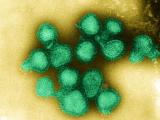Apr 23, 2010 (CIDRAP News) – Australia's chief medical officer asked providers to stop giving children under age 5 the seasonal flu vaccine made by CSL Ltd after receiving reports of fever and convulsions in kids in Western Australia who had recently been immunized.
The country's drug regulatory agency, the Therapeutic Good Administration (TGA), is investigating the reports and will test samples of the vaccine that CSL has agreed to provide, Bloomberg News reported today.
CSL, an Australia-based flu vaccine producer, said in a statement today it was urgently investigating the reports along with federal and state health officials and that it has stopped distributing its pediatric vaccine to reduce the risk of inadvertent administration to children younger than 5. CSL is Australia's only flu vaccine producer, but it is one of several companies that supply seasonal flu vaccine for the Australian market.
CSL's trivalent seasonal flu vaccine covers three flu strains, including pandemic H1N1.
Over the past month, 22 children from the state were hospitalized after experiencing febrile convulsions within 12 hours of receiving the vaccine, The West Australian reported today. Health officials added that one child became seriously ill, and it was still unclear if the vaccine was the cause of the children's symptoms.
Children ages 6 months to 5 years old in Western Australia are eligible to receive free seasonal flu vaccination, and the pattern and rate of adverse events has not been seen in any of the country's other states, the TGA said in a press release today. "TGA will test batches of the vaccine used in WA for any abnormalities," the agency said, adding that other Australian states and territories are focusing their immunization efforts on high-risk groups.
The TGA also said it would explore if the reactions reported in Western Australia relate to the vaccine or the state's vaccine delivery system.
Today's warning does not apply to CSL's single-strain (monovalent) pandemic H1N1 vaccine.
The problem with CSL's vaccine comes as vaccination efforts are ramping up across Australia and other parts of the Southern Hemisphere where flu season typically begins sometime in May. Health officials in Australia have warned that the season could see the nation's second wave of pandemic flu.
Demand for the vaccine has been fairly strong, and some parts of the country have reported vaccine shortages, according to media reports.
CSL's Fluvax, available in adult and pediatric formulations, is an inactivated split-virus vaccine that does not include an adjuvant. It contains the flu strains recommended by the World Health Organization (WHO) for the Southern Hemisphere's seasonal flu vaccine: pandemic H1N1, an influenza A Perth-like H3N2, and a Brisbane-like influenza B. In February the WHO recommended similar strains for the Northern Hemisphere's next flu season.
The company's Afluria was one of six seasonal flu vaccines that were approved for use during the United States' current flu season, and CSL is one of the companies providing pandemic flu vaccine to the country. According to background from the Health Industry Distributors Association (HIDA), CSL vaccine accounted for an estimated 8 million doses, or about 7% of the nearly 115 million seasonal flu vaccine doses that were projected to be available this season.
In November the US Food and Drug Administration (FDA), under an accelerated process, expanded its approval of CSL's seasonal and pandemic vaccine for infants and children ages 6 months and older.
See also:
Apr 23 CSL press release
Apr 23 Bloomberg News story
Apr 23 West Australian story
Apr 23 TGA statement
Nov 12, 2009, FDA statement




















